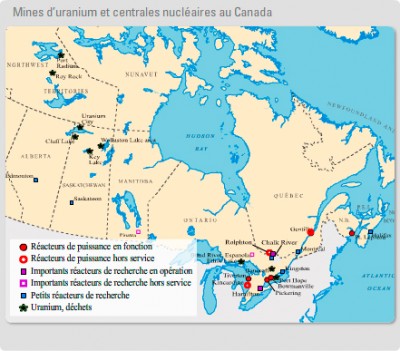Ten Years after Fukushima, Canada Still Embraces the Atom: The Debut of the Small Moderate Reactors
Conversations with Robert Hunziker and Professor M. V. Ramana

“The Liberal government says it supports small modular reactors to help Canada mitigate climate change. The government is simply barking up the wrong tree, for several reasons: cost, cost and cost, as well as renewables, safety and radioactive waste.”
– Professor M. V. Ramada [1]
“I want to puke.”
– David Suzuki [2]
LISTEN TO THE SHOW
Click to download the audio (MP3 format)
It so happens that this Spring has been the anniversary of three of the most devastating nuclear meltdowns in history – Fukushima Daiichi (March 11, 2011), Three Mile Island (March 28, 1978), and Chernobyl (April 26, 1986). [3]
A nuclear disaster of this magnitude are unique in that they is the only environmental crisis that will continue to be a threat to human health well into the future – for hundreds of years! [4]
According to standard accounts, the death toll from the Chernobyl meltdown ranged from 4,000 to 200,000 although the scientific studies by Doctors Yablokov, Vassily and Nesterenkoin their book Chernobyl: Consequences of a Catastrophe for People and the Environment placed the numbers closer to 1,000,000.[5]
The triple meltdown of Fukushima Daiichi Atomic Power Reactors event launched radiation affecting Japan and the world. About 160,000 individuals were forced to flee. Wikipedia listed 15,000 deaths mostly attributable to the earthquake and tidal wave that struck the site.[6][7]
However, Chris Busby, scientific secretary of the European Committee on Radiation Risk, predicted a death toll of more than a million through the radiation released and even discovered that the fall-out from radioactive iodine damaged thyroids in children as far away as California. Arnie Gundersen, a former nuclear industry senior vice president and chief spokesperson for Fairewinds Energy Education, has been monitoring the situation for years and similarly stated, “I believe we’re going to see as many as a million cancers over the next 30 years because of the Fukushima incident in Japan.” [8]
These incidents have generally turned the Japanese people off of nuclear but there is a key incentive that makes it appear tempting for others outside the country. [9]
The role of nuclear power is being re-examined by leaders as a mechanism for radically reducing climate change. As a result, in October of last year, the government of Canada announced an investment of $20 million dollars in small modular nuclear reactors as an attempt to meet its net zero greenhouse gas emission goals by the year 2050.[10]
Natural Resources Minister Seamus O’ Regan put it bluntly:
“We have not seen a model where we can get to net-zero emissions by 2050 without nuclear…The fact of the matter is that it produces zero emissions.”[11]
The power of the atom is an amazing phenomenon humankind has had the ability to harness. But the costs of nuclear as measured by devastating radiation and the growth of radioactive waste that we’ll have to warehouse for thousands and thousands of years should provoke thoughts among citizens about how badly we need power to boil an egg!
This week’s Global Research News Hour will look at some of the lessons learned and not learned by the meltdown of the past as the Canadian government embraces a carbon diet via a nuclear binge.
In our first half hour we hear from environmental journalist Robert Hunziker about Fukushima ten years later, its plans to allow irradiated water to be dumped directly into the Pacific Ocean, and his thoughts about the nuclear industry getting away with murder.
In our second half hour, Professor M.V. Romana explains the flaws in Canada’s Small Modular Reactors as a strategy for fighting climate change, he goes into the waste generated in them, and explores where this project intersects with energy in the global picture.
Robert Hunziger is a freelance writer and environmental journalist whose articles have been translated into foreign languages and appeared in over 50 journals, magazines, and sites worldwide. He’s made multiple appearances in electronic media to talk about global climate change as well as the aftermath of the Fukushima nuclear disaster. He is based in Los Angeles.
Professor M. V. Romana serves as the Simons chair in Disarmament, Global and Human Security. He is also the Director of the Liu Institute for Global Issues at the School of Public Policy and Global Affairs at the University of British Columbia. His recent article ‘Why the Liberals’ Nuclear Power Plan is a Pipe Dream’ warns of the Small Modular Reactors still being nuclear.
(Global Research News Hour Episode 314)
LISTEN TO THE SHOW
Click to download the audio (MP3 format)
The Global Research News Hour airs every Friday at 1pm CT on CKUW 95.9FM out of the University of Winnipeg. The programme is also podcast at globalresearch.ca .
Other stations airing the show:
CIXX 106.9 FM, broadcasting from Fanshawe College in London, Ontario. It airs Sundays at 6am.
WZBC 90.3 FM in Newton Massachusetts is Boston College Radio and broadcasts to the greater Boston area. The Global Research News Hour airs during Truth and Justice Radio which starts Sunday at 6am.
Campus and community radio CFMH 107.3fm in Saint John, N.B. airs the Global Research News Hour Fridays at 7pm.
CJMP 90.1 FM, Powell River Community Radio, airs the Global Research News Hour every Saturday at 8am.
Caper Radio CJBU 107.3FM in Sydney, Cape Breton, Nova Scotia airs the Global Research News Hour starting Wednesday afternoon from 3-4pm.
Cowichan Valley Community Radio CICV 98.7 FM serving the Cowichan Lake area of Vancouver Island, BC airs the program Thursdays at 9am pacific time.
Notes:
- https://thetyee.ca/Opinion/2018/11/07/Nuclear-Generators-Canada-Future/
- https://www.cbc.ca/radio/checkup/is-it-time-to-call-an-election-1.5728483/i-want-to-puke-david-suzuki-reacts-to-o-regan-s-nuclear-power-endorsement-1.5731819
- https://www.ucsusa.org/resources/brief-history-nuclear-accidents-worldwide
- https://www.fairewinds.org/what-is-a-meltdown
- https://www.mirror.co.uk/news/world-news/chernobyls-horrific-true-death-toll-21908352
- Justin McCurry (Mar 11, 2021), ‘Japan marks 10 years since triple disaster killed 18,500 people’, The Guardian; https://www.theguardian.com/world/2021/mar/11/japan-marks-ten-years-since-triple-disaster-killed-18500-people
- https://en.wikipedia.org/wiki/Fukushima_Daiichi_nuclear_disaster_casualties
- https://theecologist.org/2014/mar/08/no-one-died-no-ones-health-was-damaged-fukushimas-big-lie
- https://www.statista.com/statistics/1198838/japan-opinion-nuclear-power-future/
- https://www.cbc.ca/news/politics/bains-small-modular-reactors-net-zero-1.5763762
- https://www.cbc.ca/radio/thehouse/chris-hall-there-s-no-path-to-net-zero-without-nuclear-power-says-o-regan-1.5730197

